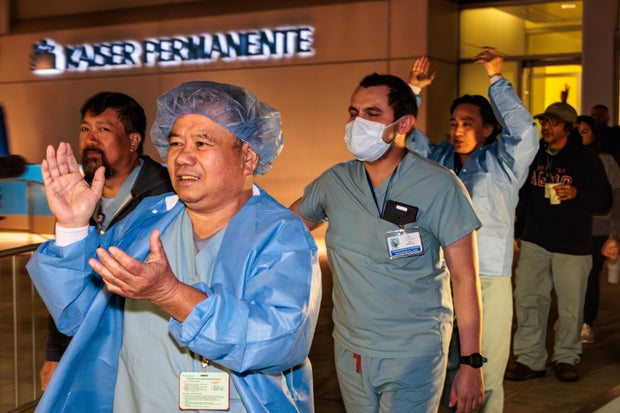More than 75,000 Kaiser Permanente workers launched a strike on Wednesday at hospitals and medical centers across five states and Washington, D.C, the largest walkout by health care workers in U.S. history.
The work stoppage involving nurses, lab technicians, pharmacists and other workers started at 6 a.m. local time at hundreds of Kaiser hospitals and medical offices in California, Colorado, Oregon, Virginia, Washington and Washington, D.C., according to the Coalition of Kaiser Permanente Unions.
The strike, which schedule to last three days, threatens to disrupt medical services for almost 13 million people, curtailing nonessential care like routine checkups. Hospitals and emergency department will continue to operate, staffed by doctors, managers and “contingent workers,” said Oakland-based Kaiser, the nation’s biggest provider of managed care services.
Kaiser management and union representatives are still at the bargaining table after working through the night in an effort to break the impasse, a spokesperson for Kaiser said by email. “There has been a lot of progress, with agreements reached on several specific proposals late Tuesday,” the spokesperson said.
“Breakdown” in patient care
Kaiser workers contend that chronic understaffing is boosting the company’s bottom line but harming patients and staff morale. Kaiser maintains it’s doing the best it can in an industry with a shortage of workers. Employees who spoke to CBS MoneyWatch expressed frustration at having to rush to care for too many patients with too little time and not enough backup.
Ultrasound technician Michael Ramey, who has worked at Kaiser for 27 years, said the job he once loved is “heartbreaking” and “stressful” due to a staffing crisis that he and his colleagues argue harms both employee morale and patient treatment.
“You don’t have the ability to care for patients in the manner they deserve,” said Ramey, 57, who works at a Kaiser clinic in San Diego and is president of his local union. “We are willing to do whatever it takes to ensure we have a contract in place that allows us to be staffed at the levels where we need to be.”
Interacting with patients, Ramey also said he often gets customer complaints about not being able to schedule medical procedures in a timely fashion. “They are telling you how long it took to get the appointment, and then you have to tell them how long it will be to get results,” he said. “There’s a breakdown in the quality of care. These are people in our communities.”
Kaiser workers are burning themselves out “trying to do the jobs of two or three people, and our patients suffer when they can’t get the care they need due to Kaiser’s short-staffing,” Jessica Cruz, a licensed vocational nurse at Kaiser Los Angeles Medical Center, said in an emailed statement.
The Coalition of Kaiser Permanente Unions is also asking for a $25 hourly minimum wage, as well as increases of 7% each year in the first two years and 6.25% each year in the two years afterward.
“Hospital strikes are complicated, unlike striking at an auto plant for example, you don’t want to close down the facility,” Gabriel Winant, a labor exper and assistant professor of U.S. history at the University of Chicago, told CBS MoneyWatch. “If you strike a hospital people can die — that’s not your goal.”


